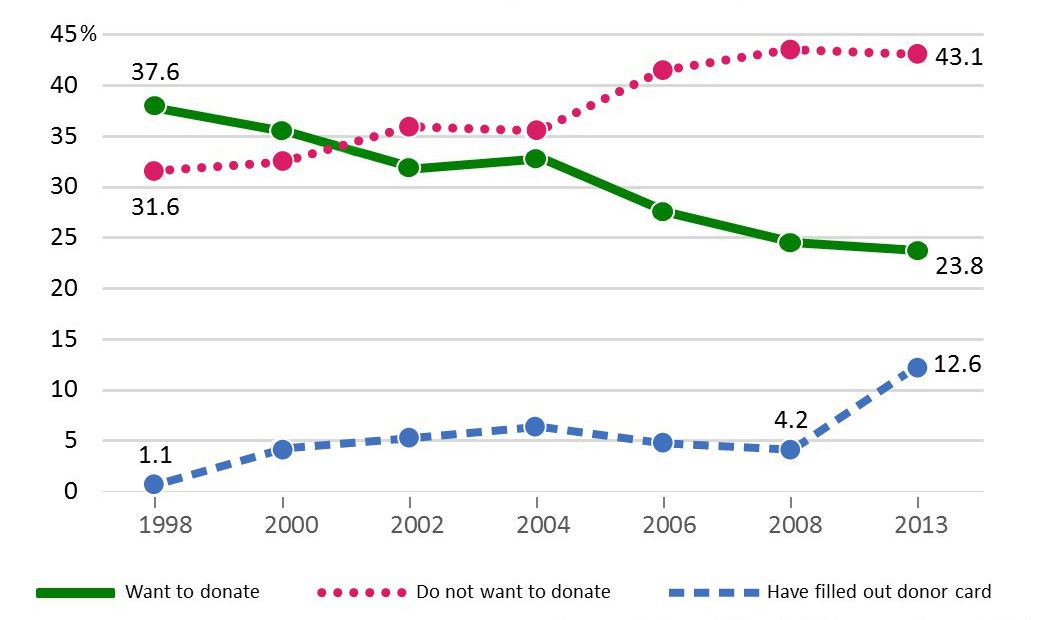Aiming for 1,000 Organ Transplants Annually in 5 YearsThe Nippon Foundation supporting JOT Network to strengthen operating base
On the occasion of the 20th anniversary of the enactment of the Organ Transplant Act in October, The Nippon Foundation has decided to provide support in the amount of 120 million yen this fiscal year to the Japan Organ Transplant Network (JOTN), Japan’s leading organization involved in facilitating organ donation, to strengthen the organization’s operating base.
Japan ranks at the bottom rung internationally in organ donation, and the support is being provided to improve this situation. At a press conference held at The Nippon Foundation headquarters on July 31, The Nippon Foundation Chairman Yohei Sasakawa commented, “We need to increase the current level by a factor of roughly 10, to bring Japan to the same level as New Zealand and South Korea,” and added, “This is an important issue related to human life. I hope the government will take action as well.” Morito Monden, president of JOTN, expressed his determination, noting, “The current number of organ transplants is roughly 100 per year, and I hope we can increase this to 1,000 in five years.”

Working to bring donation rate to international level
JOTN focuses on transplants from deceased donors after brain death or cardiac death, and as of June 2017 had approximately 13,450 registered patients waiting for a heart, liver, kidney, or other organ transplant. At the same time, the number of organs actually registered as having been available for transfer during fiscal 2016 was only 103, and in the case of heart transplants, approximately 300 of 1,350 registered patients died while waiting for a transplant.
Because of the small number of donors, Japan has one of the lowest rates of organ donation among industrialized countries. Spain is the highest at 35 donations per one million deaths, while the United States has 26, Britain 20.8, and South Korea 8.4, but Japan has only 0.7. In many countries organ transplantation has come to be viewed as a general medical procedure, but in Japan it is only done in extremely special circumstances. For example, 90% of kidney transplants in Japan involve live donors, primarily family members of the recipient.
For the time being, The Nippon Foundation plans to support JOTN for two years; the 120 million yen is for the first year, and an application has already been received for the second year’s portion. At the press conference, Mr. Sasakawa noted the principle that “persons should receive organ transplants in their country of residence or citizenship,” as per the 2008 Declaration of Istanbul on Organ Trafficking and Transplant Tourism. He also pointed out that the majority of Japan’s more than 320,000 patients with kidney failure spend up to five hours each day on dialysis, severely limiting their daily lives, and stressed the importance of promoting organ transplants and strengthening JOTN.

Opting In: The individual indicates their intention or the family agrees to the donation of an organ or organs while the individual is alive. In Japan, current law is based in principle of opting in. When the individual’s intention while alive is unclear, the family may agree to organ donation.
Opting Out: A person is considered to be a potential donor unless while alive they have indicated their opposition to being a donor. In most cases, if at death the family opposes organ donation, organs will not be donated.
Dr. Monden explained that JOTN will use the support to provide additional training to its 32 organ transplant coordinators across Japan and improve its transportation methods for organs. He added that JOTN will also strengthen its activities to promote awareness of organ donation, noting that a 2013 Cabinet Office survey indicated that more than 40% of people want to be organ donors.
Overcoming historical and cultural resistance
Even after the enactment of the Organ Transplant Act in 1997, the majority of organ transplants in Japan involved heart-dead donors, with only 3 to 13 organ transplants involving brain-dead donors annually. There has been a shift toward transplants involving brain-dead donors since the Organ Transplant Act was revised in 2010 based on the Declaration of Istanbul, but nevertheless there were only 64 organ transplants involving brain-dead donors in 2016.
Japan’s low number of organ transplants from brain-dead donors is due to a lingering sense of apprehension from Japan’s first heart transplant, the “Wada heart transplant,” carried at Sapporo Medical University with a brain-dead donor in 1968, as well as cultural considerations regarding death. The Wada heart transplant was controversial because Dr. Juro Wada made both the determination of brain death, which was not legally defined at the time, and performed the operation himself. The recipient died less than three months after the operation and Dr. Wada was charged with manslaughter, but the charges were eventually dropped. The issues that arose, however, resulted in an effective halt to organ transplants from brain-dead donors until the enactment of the Organ Transplant Act.
Attitudes gradually changing

In terms of attitudes toward donation, Cabinet Office surveys show that from 1998 to 2013, the percentage of people wanting to be an organ donor rose to 43.1% from 31.6%, while the percentage who did not want to be donors declined to 23.8% from 37.6%, with the percentage wanting to donate surpassing the percentage who did not want to donate in 2001. The percentage of people who had filled out a donor card rose slightly, to 4.2% from 1.1%, over the period from 1998 to 2008, but then increased considerably, to 12.6% in 2013. This can be seen as a result of the revisions to the Organ Transplant Act enacted in 2010, which allowed people to indicate their willingness to donate (opt in) on the back of their national health insurance card and (from 2012) on the back of their driver’s license.
Contact
Communications Department
The Nippon Foundation



